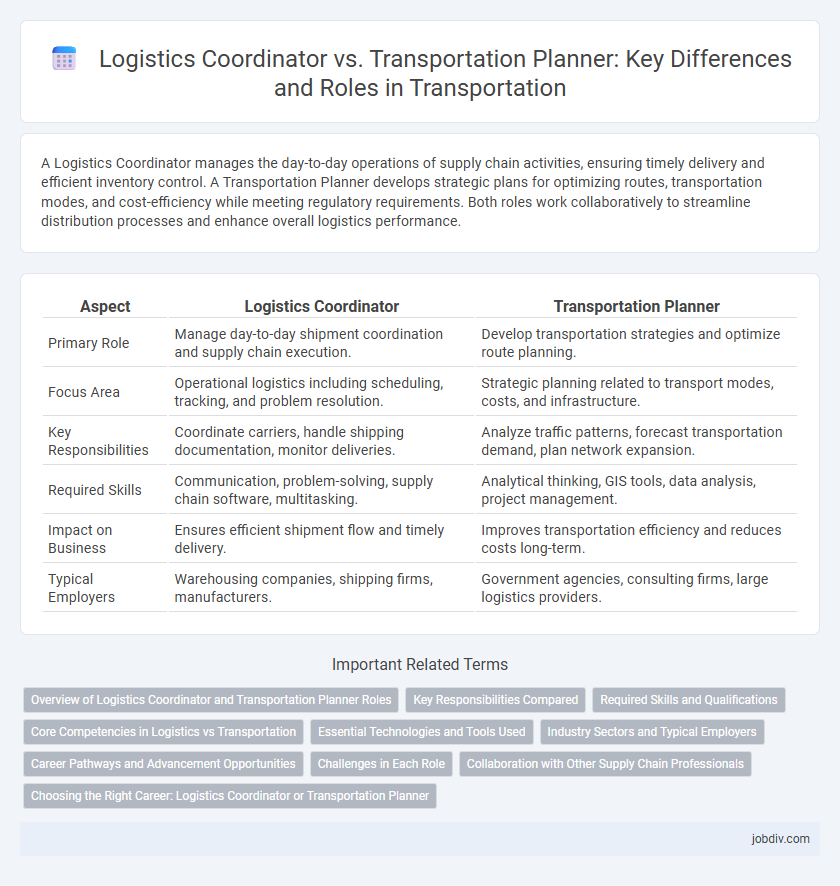A Logistics Coordinator manages the day-to-day operations of supply chain activities, ensuring timely delivery and efficient inventory control. A Transportation Planner develops strategic plans for optimizing routes, transportation modes, and cost-efficiency while meeting regulatory requirements. Both roles work collaboratively to streamline distribution processes and enhance overall logistics performance.
Table of Comparison
| Aspect | Logistics Coordinator | Transportation Planner |
|---|---|---|
| Primary Role | Manage day-to-day shipment coordination and supply chain execution. | Develop transportation strategies and optimize route planning. |
| Focus Area | Operational logistics including scheduling, tracking, and problem resolution. | Strategic planning related to transport modes, costs, and infrastructure. |
| Key Responsibilities | Coordinate carriers, handle shipping documentation, monitor deliveries. | Analyze traffic patterns, forecast transportation demand, plan network expansion. |
| Required Skills | Communication, problem-solving, supply chain software, multitasking. | Analytical thinking, GIS tools, data analysis, project management. |
| Impact on Business | Ensures efficient shipment flow and timely delivery. | Improves transportation efficiency and reduces costs long-term. |
| Typical Employers | Warehousing companies, shipping firms, manufacturers. | Government agencies, consulting firms, large logistics providers. |
Overview of Logistics Coordinator and Transportation Planner Roles
A Logistics Coordinator manages the flow of goods, coordinates shipments, and ensures timely delivery by liaising with suppliers, carriers, and customers. A Transportation Planner focuses on designing and optimizing transportation systems, analyzing routes, and developing efficient plans to minimize costs and improve transit times. Both roles are critical in supply chain management but differ in operational execution and strategic planning aspects.
Key Responsibilities Compared
Logistics Coordinators manage the day-to-day movement of goods, ensuring order fulfillment, shipment tracking, and coordination with carriers and warehouses for timely delivery. Transportation Planners focus on designing efficient transportation routes, analyzing traffic patterns, and optimizing fleet utilization to reduce costs and improve transit times. Both roles collaborate to enhance supply chain efficiency but differ in operational execution versus strategic planning.
Required Skills and Qualifications
Logistics Coordinators require strong organizational skills, proficiency in inventory management software, and effective communication abilities to coordinate shipments and liaise with suppliers and carriers. Transportation Planners need expertise in route optimization, data analysis, and regulatory compliance, alongside advanced knowledge of geographic information systems (GIS) and transportation modeling tools. Both roles demand problem-solving skills, attention to detail, and a solid understanding of supply chain dynamics to ensure efficient and cost-effective transportation operations.
Core Competencies in Logistics vs Transportation
Logistics Coordinators excel in inventory management, order fulfillment, and vendor communication, ensuring efficient supply chain operations and timely delivery. Transportation Planners specialize in route optimization, fleet management, and compliance with transportation regulations to minimize costs and enhance distribution efficiency. Both roles require strong analytical skills, but Logistics Coordinators focus more on end-to-end supply chain coordination while Transportation Planners emphasize strategic routing and transportation network design.
Essential Technologies and Tools Used
Logistics Coordinators primarily utilize warehouse management systems (WMS), transportation management systems (TMS), and enterprise resource planning (ERP) software to optimize inventory control and shipment scheduling. Transportation Planners focus on geographic information systems (GIS), route optimization software, and traffic simulation tools to design efficient transportation networks and reduce transit times. Both roles rely on real-time tracking technologies and data analytics platforms to enhance operational visibility and decision-making accuracy.
Industry Sectors and Typical Employers
Logistics Coordinators commonly work in manufacturing, retail, and warehousing sectors, managing supply chain operations for companies like Amazon, Walmart, and FedEx. Transportation Planners are often employed in public agencies, urban planning firms, and consulting companies such as municipal transportation departments and AECOM. Both roles are critical in industries focusing on freight, distribution, and infrastructure development.
Career Pathways and Advancement Opportunities
Logistics coordinators typically start in entry-level roles managing supply chain operations and can advance to senior logistics manager or supply chain director positions by gaining expertise in inventory control and vendor relationships. Transportation planners often begin with data analysis and route planning responsibilities, progressing to senior planner, project manager, or urban transportation planner roles by developing skills in traffic modeling and regulatory compliance. Both career pathways emphasize continuous learning and certification, such as Certified Supply Chain Professional (CSCP) for logistics coordinators and Professional Transportation Planner (PTP) for transportation planners, enhancing advancement opportunities.
Challenges in Each Role
Logistics Coordinators face challenges managing real-time supply chain disruptions, optimizing inventory flow, and coordinating multiple stakeholders to ensure timely deliveries. Transportation Planners struggle with route optimization under fluctuating traffic conditions, regulatory compliance across jurisdictions, and forecasting transportation demand to balance cost and service quality. Both roles require advanced problem-solving skills to address unpredictable variables in transportation and logistics operations.
Collaboration with Other Supply Chain Professionals
Logistics Coordinators and Transportation Planners both play critical roles in supply chain management by collaborating closely with procurement specialists, warehouse managers, and distribution teams to ensure seamless flow of goods. Transportation Planners optimize route schedules and carrier selections, working with inventory analysts to align transportation capacity with demand forecasts. Meanwhile, Logistics Coordinators focus on real-time shipment tracking and problem resolution, coordinating efforts between suppliers, carriers, and customers to maintain delivery timelines and minimize disruptions.
Choosing the Right Career: Logistics Coordinator or Transportation Planner
Choosing between a Logistics Coordinator and a Transportation Planner depends on career focus and skill sets; Logistics Coordinators excel in managing supply chain operations, coordinating shipments, and ensuring timely delivery, while Transportation Planners specialize in developing efficient transportation systems, route optimization, and long-term infrastructure planning. Key factors include interest in tactical execution versus strategic analysis, proficiency in logistics software or GIS tools, and career goals within supply chain management or urban transportation development. Salary expectations and job market demand also influence the decision, with Logistics Coordinators often gaining roles in warehousing and distribution centers, and Transportation Planners finding opportunities in government agencies and consultancy firms.
Logistics Coordinator vs Transportation Planner Infographic

 jobdiv.com
jobdiv.com